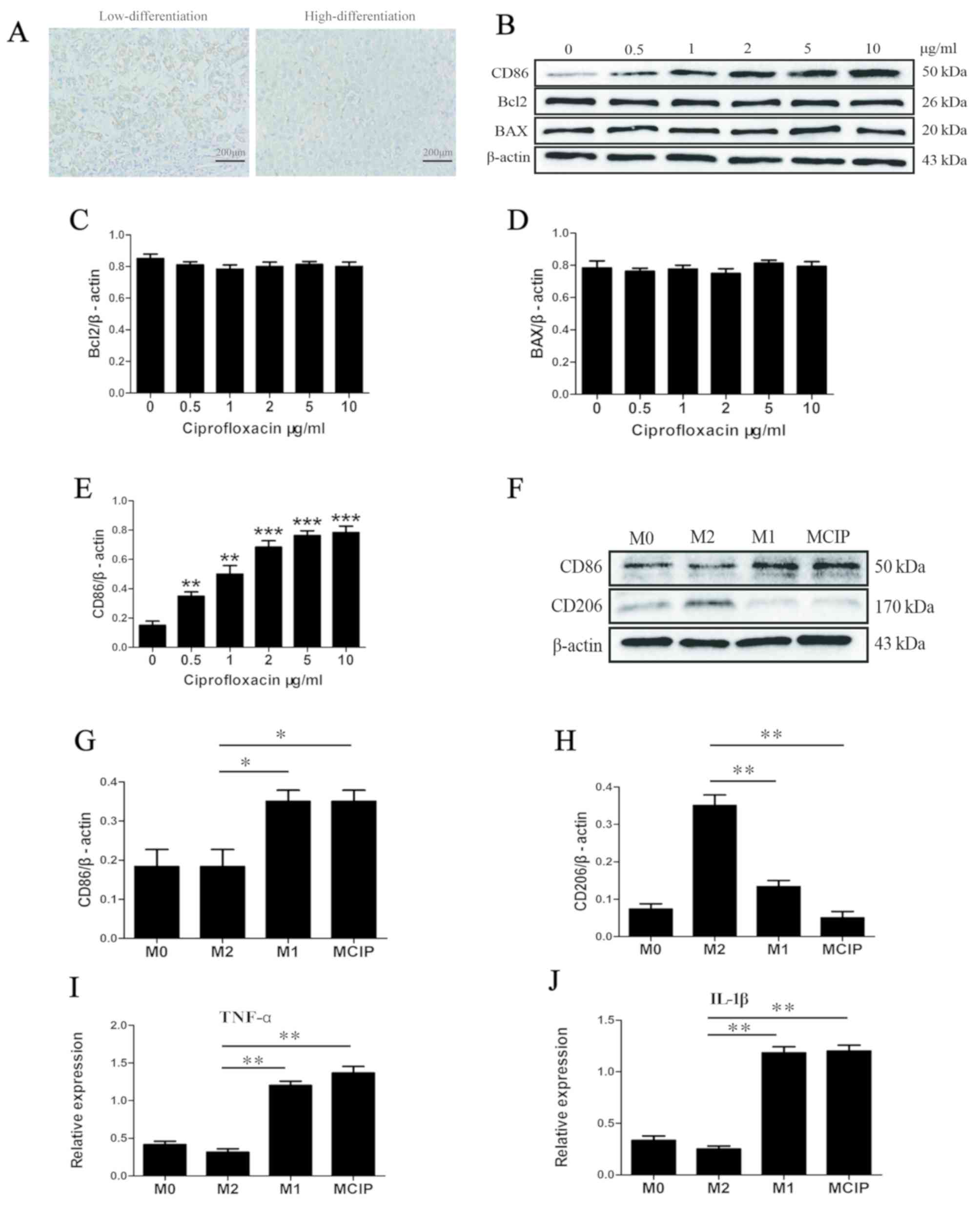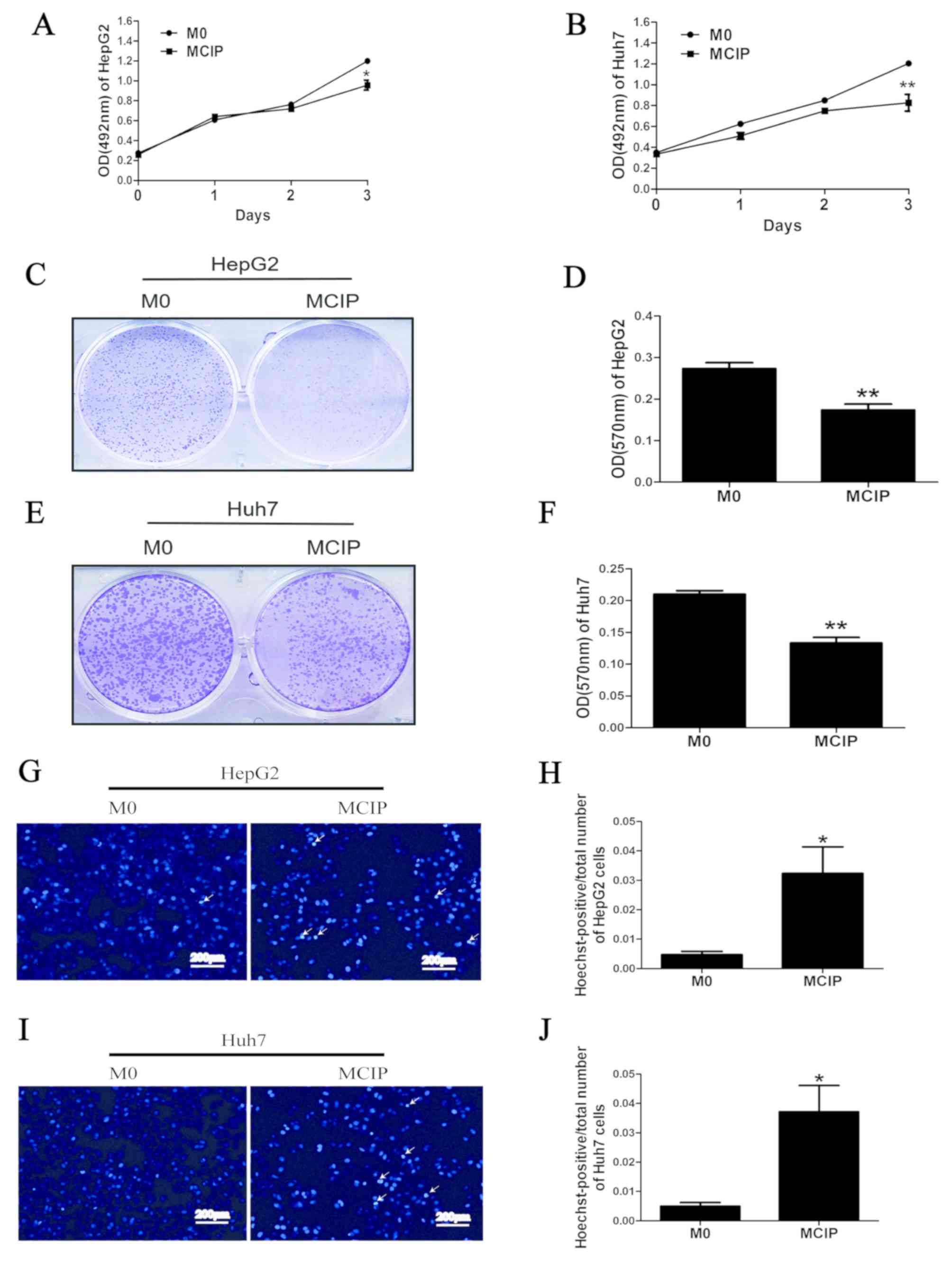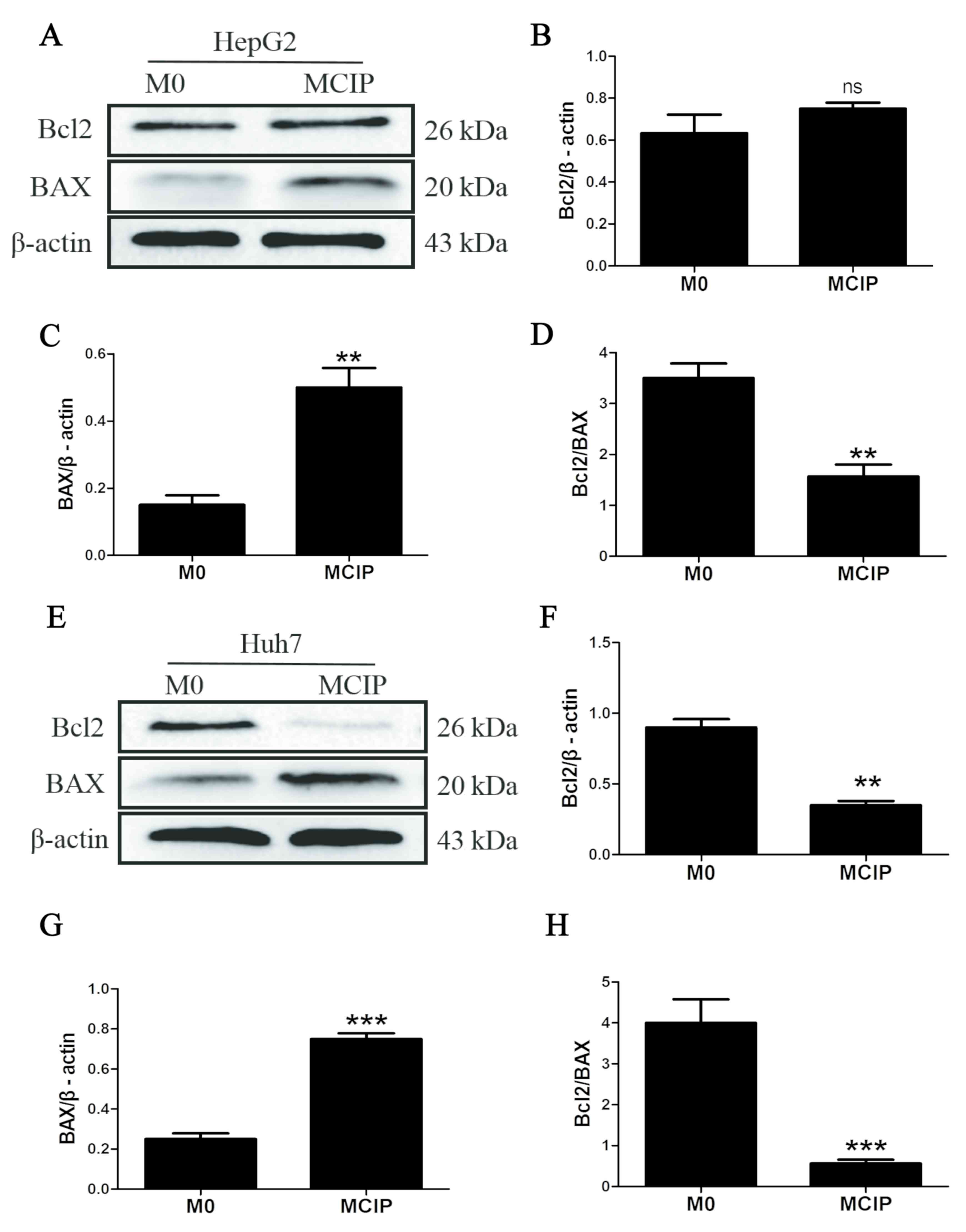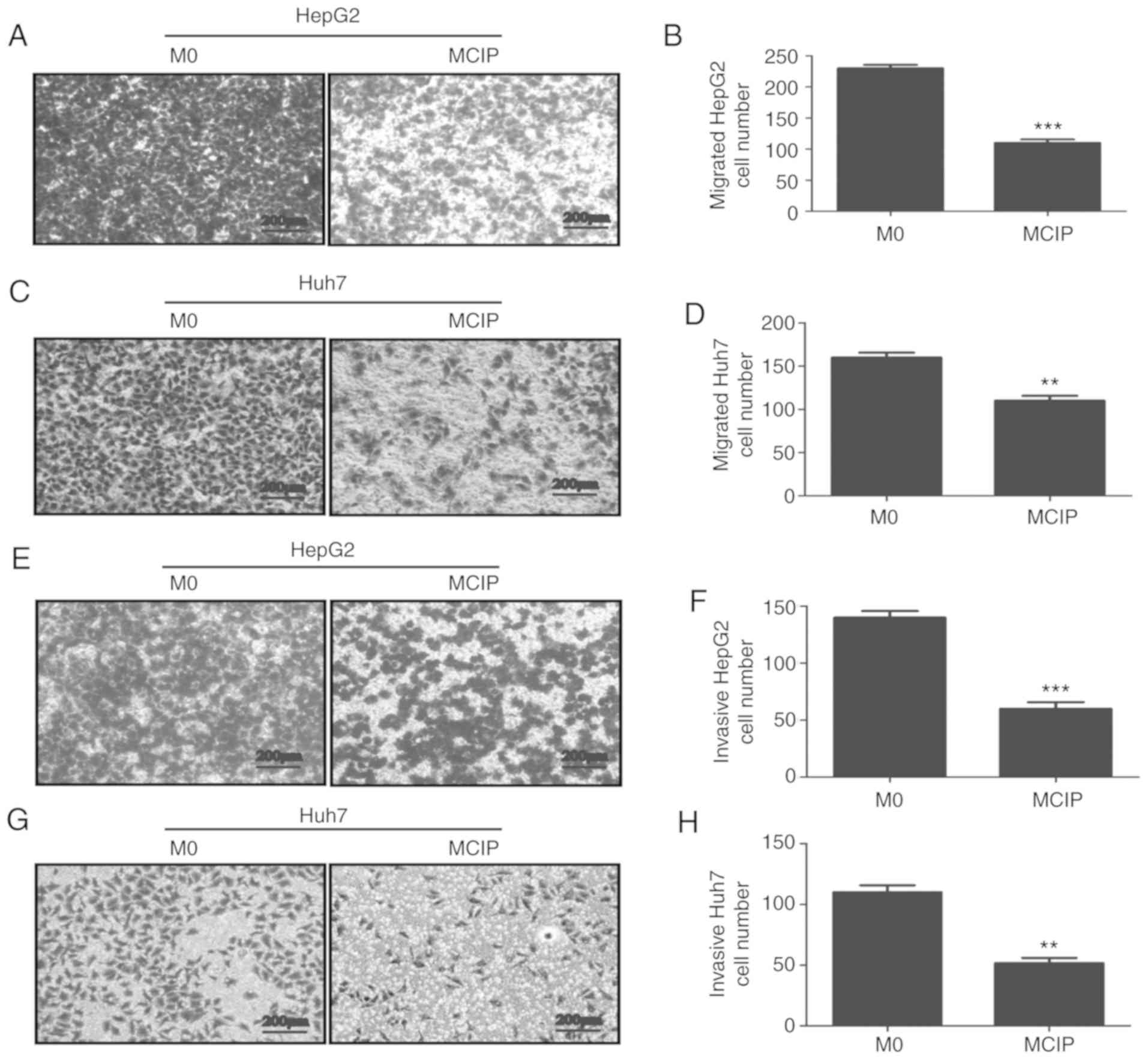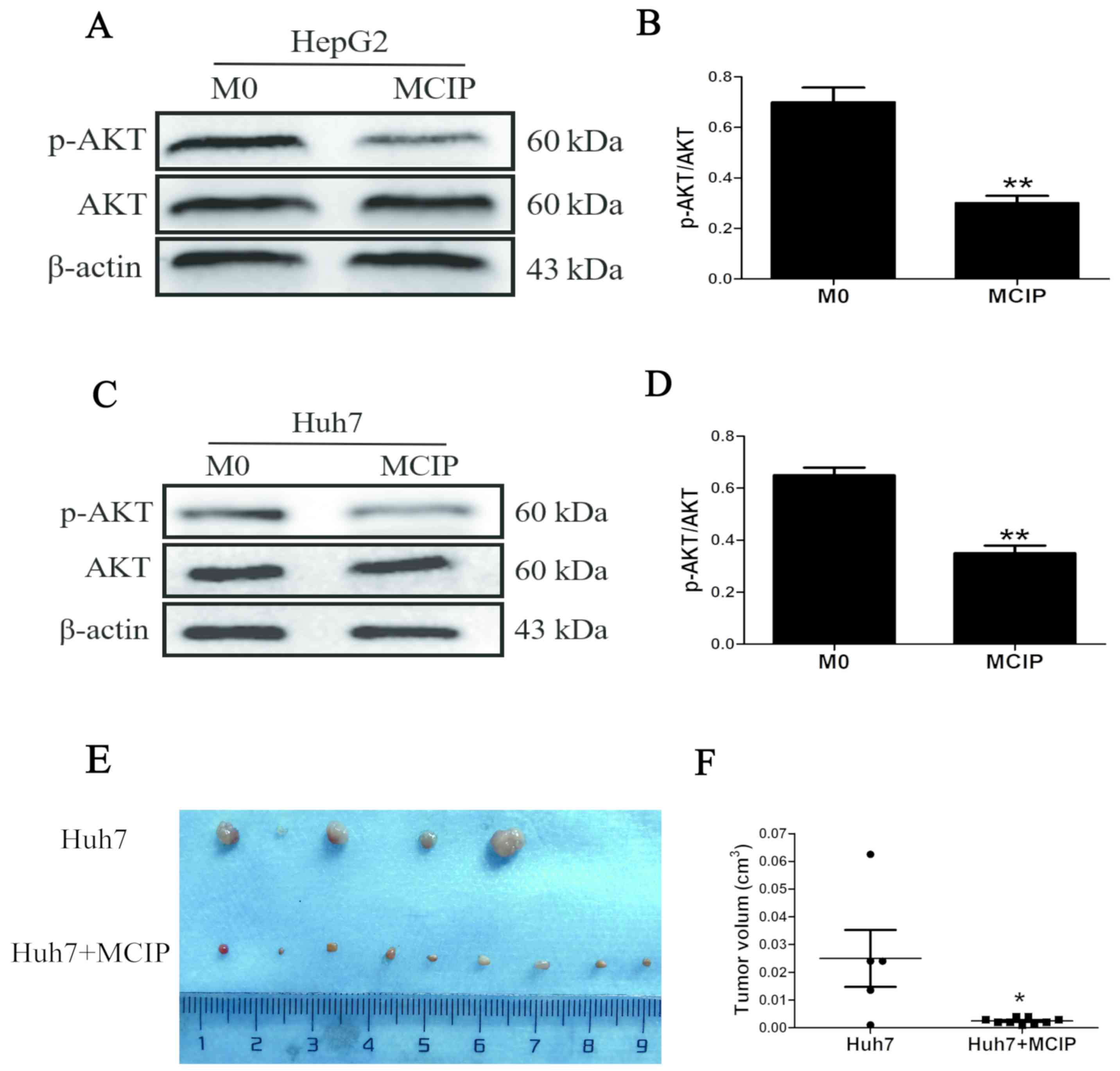|
1
|
Bray F, Ferlay J, Soerjomataram I, Siegel
RL, Torre LA and Jemal A: Global cancer statistics 2018: GLOBOCAN
estimates of incidence and mortality worldwide for 36 cancers in
185 countries. CA Cancer J Clin. 68:394–424. 2018. View Article : Google Scholar : PubMed/NCBI
|
|
2
|
Eggert T and Greten TF: Current standard
and future perspectives in non-surgical therapy for hepatocellular
carcinoma. Digestion. 96:1–4. 2017. View Article : Google Scholar : PubMed/NCBI
|
|
3
|
Ohri N, Dawson LA, Krishnan S, Seong J,
Cheng JC, Sarin SK, Kinkhabwala M, Ahmed MM, Vikram B, Coleman CN
and Guha C: Radiotherapy for hepatocellular carcinoma: New
indications and directions for future study. J Natl Cancer Inst.
108:djw1332016. View Article : Google Scholar : PubMed/NCBI
|
|
4
|
Ikeda M, Morizane C, Ueno M, Okusaka T,
Ishii H and Furuse J: Chemotherapy for hepatocellular carcinoma:
Current status and future perspectives. Jpn J Clin Oncol.
48:103–114. 2018. View Article : Google Scholar : PubMed/NCBI
|
|
5
|
Kim E, Lisby A, Ma C, Lo N, Ehmer U, Hayer
KE, Furth EE and Viatour P: Promotion of growth factor signaling as
a critical function of β-catenin during HCC progression. Nat
Commun. 10:19092019. View Article : Google Scholar : PubMed/NCBI
|
|
6
|
Geller LT, Barzily-Rokni M, Danino T,
Jonas OH, Shental N, Nejman D, Gavert N, Zwang Y, Cooper ZA, Shee
K, et al: Potential role of intratumor bacteria in mediating tumor
resistance to the chemotherapeutic drug gemcitabine. Science.
357:1156–1160. 2017. View Article : Google Scholar : PubMed/NCBI
|
|
7
|
Pushalkar S, Hundeyin M, Daley D,
Zambirinis CP, Kurz E, Mishra A, Mohan N, Aykut B, Usyk M, Torres
LE, et al: The pancreatic cancer microbiome promotes oncogenesis by
induction of innate and adaptive immune suppression. Cancer Discov.
8:403–416. 2018. View Article : Google Scholar : PubMed/NCBI
|
|
8
|
Zhang HL, Yu LX, Yang W, Tang L, Lin Y, Wu
H, Zhai B, Tan YX, Shan L, Liu Q, et al: Profound impact of gut
homeostasis on chemically-induced pro-tumorigenic inflammation and
hepatocarcinogenesis in rats. J Hepatol. 57:803–812. 2012.
View Article : Google Scholar : PubMed/NCBI
|
|
9
|
Yu LX and Schwabe RF: The gut microbiome
and liver cancer: Mechanisms and clinical translation. Nat Rev
Gastroenterol Hepatol. 14:527–539. 2017. View Article : Google Scholar : PubMed/NCBI
|
|
10
|
Dapito DH, Mencin A, Gwak GY, Pradere JP,
Jang MK, Mederacke I, Caviglia JM, Khiabanian H, Adeyemi A,
Bataller R, et al: Promotion of hepatocellular carcinoma by the
intestinal microbiota and TLR4. Cancer Cell. 21:504–516. 2012.
View Article : Google Scholar : PubMed/NCBI
|
|
11
|
Shalapour S, Lin XJ, Bastian IN, Brain J,
Burt AD, Aksenov AA, Vrbanac AF, Li W, Perkins A, Matsutani T, et
al: Inflammation-induced IgA+ cells dismantle anti-liver cancer
immunity. Nature. 551:340–345. 2017. View Article : Google Scholar : PubMed/NCBI
|
|
12
|
Aldred KJ, Kerns RJ and Osheroff N:
Mechanism of quinolone action and resistance. Biochemistry.
53:1565–1574. 2014. View Article : Google Scholar : PubMed/NCBI
|
|
13
|
Hangas A, Aasumets K, Kekalainen NJ,
Paloheinä M, Pohjoismäki JL, Gerhold JM and Goffart S:
Ciprofloxacin impairs mitochondrial DNA replication initiation
through inhibition of Topoisomerase 2. Nucleic Acids Res.
46:9625–9636. 2018. View Article : Google Scholar : PubMed/NCBI
|
|
14
|
Herold C, Ocker M, Ganslmayer M, Gerauer
H, Hahn EG and Schuppan D: Ciprofloxacin induces apoptosis and
inhibits proliferation of human colorectal carcinoma cells. Br J
Cancer. 86:443–448. 2002. View Article : Google Scholar : PubMed/NCBI
|
|
15
|
Beberok A, Wrzesniok D, Rok J, Rzepka Z,
Respondek M and Buszman E: Ciprofloxacin triggers the apoptosis of
human triple-negative breast cancer MDA-MB-231 cells via the
p53/Bax/Bcl-2 signaling pathway. Int J Oncol.V. 52:1727–1737.
2018.
|
|
16
|
Yadav V, Varshney P, Sultana S, Yadav J
and Saini N: Moxifloxacin and ciprofloxacin induces S-phase arrest
and augments apoptotic effects of cisplatin in human pancreatic
cancer cells via ERK activation. BMC Cancer. 15:5812015. View Article : Google Scholar : PubMed/NCBI
|
|
17
|
Bottcher JP, Bonavita E, Chakravarty P,
Blees H, Cabeza-Cabrerizo M, Sammicheli S, Rogers NC, Sahai E,
Zelenay S and Reis e Sousa C: NK cells stimulate recruitment of
cDC1 into the tumor microenvironment promoting cancer immune
control. Cell. 172:1022–1037 e14. 2018. View Article : Google Scholar : PubMed/NCBI
|
|
18
|
Su S, Chen J, Yao H, Liu J, Yu S, Lao L,
Wang M, Luo M, Xing Y, Chen F, et al:
CD10+GPR77+ cancer-associated fibroblasts
promote cancer formation and chemoresistance by sustaining cancer
stemness. Cell. 172:841–856 e16. 2018. View Article : Google Scholar : PubMed/NCBI
|
|
19
|
Huelsken J and Hanahan D: A subset of
cancer-associated fibroblasts determines therapy resistance. Cell.
172:643–644. 2018. View Article : Google Scholar : PubMed/NCBI
|
|
20
|
Dalton HJ, Pradeep S, McGuire M,
Hailemichael Y, Ma S, Lyons Y, Armaiz-Pena GN, Previs RA, Hansen
JM, Rupaimoole R, et al: Macrophages facilitate resistance to
anti-VEGF therapy by altered VEGFR expression. Clin Cancer Res.
23:7034–7046. 2017. View Article : Google Scholar : PubMed/NCBI
|
|
21
|
Chavez-Galan L, Olleros ML, Vesin D and
Garcia I: Much more than M1 and M2 macrophages, there are also
CD169(+) and TCR(+) macrophages. Front Immunol.
6:2632015.PubMed/NCBI
|
|
22
|
Huang YK, Wang M, Sun Y, Di Costanzo N,
Mitchell C, Achuthan A, Hamilton JA, Busuttil RA and Boussioutas A:
Macrophage spatial heterogeneity in gastric cancer defined by
multiplex immunohistochemistry. Nat Commun. 10:39282019. View Article : Google Scholar : PubMed/NCBI
|
|
23
|
Zusso M, Lunardi V, Franceschini D,
Pagetta A, Lo R, Stifani S, Frigo AC, Giusti P and Moro S:
Ciprofloxacin and levofloxacin attenuate microglia inflammatory
response via TLR4/NF-kB pathway. J Neuroinflammation. 16:1482019.
View Article : Google Scholar : PubMed/NCBI
|
|
24
|
Shaki F, Ashari S and Ahangar N: Melatonin
can attenuate ciprofloxacin induced nephrotoxicity: Involvement of
nitric oxide and TNF-α. Biomed Pharmacother. 84:1172–1178. 2016.
View Article : Google Scholar : PubMed/NCBI
|
|
25
|
Bray F, Ferlay J, Laversanne M, Brewster
DH, Gombe Mbalawa C, Kohler B, Piñeros M, Steliarova-Foucher E,
Swaminathan R, Antoni S, et al: Cancer incidence in five
continents: Inclusion criteria, highlights from Volume X and the
global status of cancer registration. Int J Cancer. 137:2060–2071.
2015. View Article : Google Scholar : PubMed/NCBI
|
|
26
|
Broutier L, Mastrogiovanni G, Verstegen
MM, Francies HE, Gavarró LM, Bradshaw CR, Allen GE, Arnes-Benito R,
Sidorova O, Gaspersz MP, et al: Human primary liver cancer-derived
organoid cultures for disease modeling and drug screening. Nat Med.
23:1424–1435. 2017. View Article : Google Scholar : PubMed/NCBI
|
|
27
|
van Malenstein H, Dekervel J, Verslype C,
Van Cutsem E, Windmolders P, Nevens F and van Pelt J: Long-term
exposure to sorafenib of liver cancer cells induces resistance with
epithelial-to-mesenchymal transition, increased invasion and risk
of rebound growth. Cancer Lett. 329:74–83. 2013. View Article : Google Scholar : PubMed/NCBI
|
|
28
|
Yang JD, Hainaut P, Gores GJ, Amadou A,
Plymoth A and Roberts LR: A global view of hepatocellular
carcinoma: Trends, risk, prevention and management. Nat Rev
Gastroenterol Hepatol. 16:589–604. 2019. View Article : Google Scholar : PubMed/NCBI
|
|
29
|
Zhang GF, Liu X, Zhang S, Pan B and Liu
ML: Ciprofloxacin derivatives and their antibacterial activities.
Eur J Med Chem. 146:599–612. 2018. View Article : Google Scholar : PubMed/NCBI
|
|
30
|
Delgado JL, Hsieh CM, Chan NL and Hiasa H:
Topoisomerases as anticancer targets. Biochem J. 475:373–398. 2018.
View Article : Google Scholar : PubMed/NCBI
|
|
31
|
Liu Q, Zhang Y, Liu S, Liu Y, Yang X, Liu
G, Shimizu T, Ikenaka K, Fan K and Ma J: Cathepsin C promotes
microglia M1 polarization and aggravates neuroinflammation via
activation of Ca2+-dependent PKC/p38MAPK/NF-KB pathway.
J Neuroinflammation. 16:102019. View Article : Google Scholar : PubMed/NCBI
|
|
32
|
Tian L, Li W, Yang L, Chang N, Fan X, Ji
X, Xie J, Yang L and Li L: Cannabinoid receptor 1 participates in
liver inflammation by promoting M1 macrophage polarization via
rhoA/NF-KB p65 and ERK1/2 pathways, respectively, in mouse liver
fibrogenesis. Front Immunol. 8:12142017. View Article : Google Scholar : PubMed/NCBI
|
|
33
|
Nawaz A, Aminuddin A, Kado T, Takikawa A,
Yamamoto S, Tsuneyama K, Igarashi Y, Ikutani M, Nishida Y, Nagai Y,
et al: CD206(+) M2-like macrophages regulate systemic glucose
metabolism by inhibiting proliferation of adipocyte progenitors.
Nat Commun. 8:2862017. View Article : Google Scholar : PubMed/NCBI
|
|
34
|
Ji J, Xue TF, Guo XD, Yang J, Guo RB, Wang
J, Huang JY, Zhao XJ and Sun XL: Antagonizing peroxisome
proliferator-activated receptor ү facilitates M1-to-M2 shift of
microglia by enhancing autophagy via the LKB1-AMPK signaling
pathway. Aging Cell. 17:e127742018. View Article : Google Scholar : PubMed/NCBI
|
|
35
|
Jaiswal A, Reddy SS, Maurya M, Maurya P
and Barthwal MK: MicroRNA-99a mimics inhibit M1 macrophage
phenotype and adipose tissue inflammation by targeting TNFα. Cell
Mol Immunol. 16:495–507. 2019. View Article : Google Scholar : PubMed/NCBI
|
|
36
|
Hirayama D, Iida T and Nakase H: The
phagocytic function of macrophage-enforcing innate immunity and
tissue homeostasis. Int J Mol Sci. 19:E922017. View Article : Google Scholar : PubMed/NCBI
|
|
37
|
Huber-Ruano I, Raventos C, Cuartas I,
Sánchez-Jaro C, Arias A, Parra JL, Wosikowski K, Janicot M and
Seoane J: An antisense oligonucleotide targeting TGF-β2 inhibits
lung metastasis and induces CD86 expression in tumor-associated
macrophages. Ann Oncol. 28:2278–2285. 2017. View Article : Google Scholar : PubMed/NCBI
|
|
38
|
Chen Y, Zhang S, Wang Q and Zhang X:
Tumor-recruited M2 macrophages promote gastric and breast cancer
metastasis via M2 macrophage-secreted CHI3L1 protein. J Hematol
Oncol. 10:362017. View Article : Google Scholar : PubMed/NCBI
|
|
39
|
Haque A, Moriyama M, Kubota K, Ishiguro N,
Sakamoto M, Chinju A, Mochizuki K, Sakamoto T, Kaneko N, Munemura
R, et al: CD206+ tumor-associated macrophages promote
proliferation and invasion in oral squamous cell carcinoma via EGF
production. Sci Rep. 9:146112019. View Article : Google Scholar : PubMed/NCBI
|
|
40
|
Wynn TA, Chawla A and Pollard JW:
Macrophage biology in.development, homeostasis, and disease.
Nature. 496:445–455. 2013. View Article : Google Scholar : PubMed/NCBI
|
|
41
|
Song Y, Tang C and Yin C: Combination
antitumor immunotherapy with VEGF and PIGF siRNA via systemic
delivery of multi-functionalized nanoparticles to tumor-associated
macrophages and breast cancer cells. Biomaterials. 185:117–132.
2018. View Article : Google Scholar : PubMed/NCBI
|
|
42
|
Tjiu JW, Chen JS, Shun CT, Lin SJ, Liao
YH, Chu CY, Tsai TF, Chiu HC, Dai YS, Inoue H, et al:
Tumor-associated macrophage-induced invasion and angiogenesis of
human basal cell carcinoma cells by cyclooxygenase-2 induction. J
Invest Dermatol. 129:1016–1025. 2009. View Article : Google Scholar : PubMed/NCBI
|
|
43
|
Lu C, Rong D, Zhang B, Zheng W, Wang X,
Chen Z and Tang W: Current perspectives on the immunosuppressive
tumor microenvironment in hepatocellular carcinoma: Challenges and
opportunities. Mol Cancer. 18:1302019. View Article : Google Scholar : PubMed/NCBI
|
|
44
|
Sica A, Erreni M, Allavena P and Porta C:
Macrophage polarization in pathology. Cell Mol Life Sci.
72:4111–4126. 2015. View Article : Google Scholar : PubMed/NCBI
|
|
45
|
Kubota K, Moriyama M, Furukawa S, Rafiul
HASM, Maruse Y, Jinno T, Tanaka A, Ohta M, Ishiguro N, Yamauchi M,
et al: CD163+CD204+ tumor-associated
macrophages contribute to T cell regulation via interleukin-10 and
PD-L1 production in oral squamous cell carcinoma. Sci Rep.
7:17552017. View Article : Google Scholar : PubMed/NCBI
|
|
46
|
Lopez Nadal A, Peggs D, Wiegertjes GF and
Brugman S: Exposure to antibiotics affects saponin
immersion-induced immune stimulation and shift in microbial
composition in zebrafish larvae. Front Microbiol. 9:25882018.
View Article : Google Scholar : PubMed/NCBI
|
|
47
|
Orihuela R, McPherson CA and Harry GJ:
Microglial M1/M2 polarization and metabolic states. Br J Pharmacol.
173:649–665. 2016. View Article : Google Scholar : PubMed/NCBI
|
|
48
|
Anuforom O, Wallace GR, Buckner MM and
Piddock LJ: Ciprofloxacin and ceftriaxone alter cytokine responses,
but not Toll-like receptors, to Salmonella infection in vitro. J
Antimicrob Chemother. 71:1826–1833. 2016. View Article : Google Scholar : PubMed/NCBI
|
|
49
|
Genin M, Clement F, Fattaccioli A, Raes M
and Michiels C: M1 and M2 macrophages derived from THP-1 cells
differentially modulate the response of cancer cells to etoposide.
BMC Cancer. 15:5772015. View Article : Google Scholar : PubMed/NCBI
|
|
50
|
Zhang F, Parayath NN, Ene CI, Stephan SB,
Koehne AL, Coon ME, Holland EC and Stephan MT: Genetic programming
of macrophages to perform anti-tumor functions using targeted mRNA
nanocarriers. Nat Commun. 10:39742019. View Article : Google Scholar : PubMed/NCBI
|
|
51
|
Oliphant CM and Green GM: Quinolones: A
comprehensive review. Am Fam Physician. 65:455–464. 2002.PubMed/NCBI
|
|
52
|
Buckner MMC, Ciusa ML and Piddock LJV:
Strategies to combat antimicrobial resistance: Anti-plasmid and
plasmid curing. FEMS Microbiol Rev. 42:781–804. 2018. View Article : Google Scholar : PubMed/NCBI
|
|
53
|
Wang Y, Zhang Y, Wang Z, Zhang J, Qiao RR,
Xu M, Yang N, Gao L, Qiao H, Gao M and Cao F: Optical/MRI
dual-modality imaging of M1 macrophage polarization in
atherosclerotic plaque with MARCO-targeted upconversion
luminescence probe. Biomaterials. 219:1193782019. View Article : Google Scholar : PubMed/NCBI
|
|
54
|
Di Benedetto P, Ruscitti P, Vadasz Z,
Toubi E and Giacomelli R: Macrophages with regulatory functions, a
possible new therapeutic perspective in autoimmune diseases.
Autoimmun Rev. 18:1023692019. View Article : Google Scholar : PubMed/NCBI
|
|
55
|
Lumeng CN, Bodzin JL and Saltiel AR:
Obesity induces a phenotypic switch in adipose tissue macrophage
polarization. J Clin Invest. 117:175–184. 2007. View Article : Google Scholar : PubMed/NCBI
|















